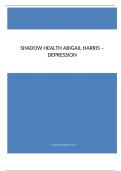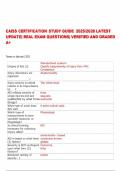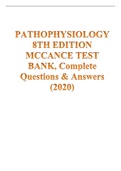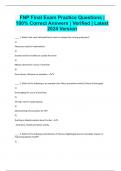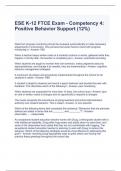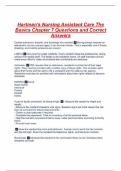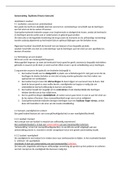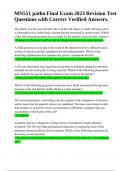CHOOSING AMONG FIVE APPROACHES (2017).
CHAPTER 2 - Philosophical Assumptions and Interpretive Frameworks
We always bring certain beliefs and philosophical assumptions to our research. Sometimes these are deeply
ingrained views about the type of problems that we need to study, what research question to ask or how we go
about gathering data.
This chapter highlights various philosophical assumptions that have occupied the mids of qualitative researchers
and the various theoretical and interpretive frameworks that enact these beliefs.
There are four philosophical assumptions:
- Ontology: the researcher’s view of reality
o Relates to the nature of reality and its characteristics
o Different researchers embrace different realities, as do the individuals being studied and the
readers of a qualitative study
- Epistemology: how the researcher knows reality
o Researchers try to get as close as possible to the participants being studied
o Subjective evidence is assembled based on individual views
- Axiology: the value-stance taken by the inquirer
o The inquirers admit the value-laden nature of information gathered from the field
o Researchers position themselves by identifying their positionality in relation to the context and
setting of the research
- Methodology: the procedures used in the study
o The procedures of qualitative research are characterized as inductive, emerging, and shaped by
the researcher’s experience in collecting and analyzing the data
These four assumptions are often applied in research through the use of paradigms and theories (interpretive
frameworks). Paradigms are a ‘basic set of beliefs that guides action’. These beliefs are brought to the process of
research by the investigator, called worldviews. Theories or theoretical orientations, on the other hand, are found
in the literature and they provide a general explanation as to what the researcher hopes to find in a study or a
lens through which to view the needs of participants and communities in a study.
Interpretive frameworks
Interpretive frameworks may be paradigms, or beliefs that the researcher rings to the process of research, or they
may be theories or theoretical orientations that guide the practice of research. Paradigm interpretative
frameworks may be:
1. Post positivism
2. Social constructivism
3. Post modern
4. Pragmatism
5. Critical theory
Theories may be social science theories to frame their theoretical lens in studies. On the other hand, the theories
may be social justice theories seeking to bring about change or address social justice issues in our societies.
Post positivism
We will use the term post positivism rather than positivism to denote this approach because post positivists do
not believe in strict cause and effect but rather recognize that all cause and effect is a probability that may or may
not occur. Post positivism has the elements of being reductionist, logical, empirical, cause-and-effect oriented,
and deterministic based on a priori theories.
Post positivist researchers view inquiry as a series of logically related steps, believe in multiple perspectives from
participants rather than a single reality, and espouse rigorous methods of qualitative data collection and analysis.
1
, Social constructivism
In social constructivism, individuals seek understanding of the world in which they live and work. They develop
subjective meanings of their experiences. These meanings are varied and multiple, leading the researcher to look
for the complexity of views rather than narrow the meanings into a few categories or ideas. The goal of research is
to rely as much as possible on the participants’ views of situation. These subjective meanings are not simply
imprinted on individuals but are formed through interaction with others and through historical and cultural norms
that operate in individuals’ lives. Rather than starting with a theory, inquirers generate or inductively develop a
theory or pattern of meaning.
Postmodern perspectives
Postmodernism might be considered a family of theories and perspectives that have something in common. The
basic concept is that knowledge claims must be set within the conditions of the world today and in the multiple
perspectives of class, race, gender and other group affiliations.
Pragmatism
Instead of a focus on methods, the important aspect of research is the problem being studied and the questions
asked about this problem. The individual using this view will use multiple methods of data collection to best
answer the research question, will employ multiple sources of data collection, will focus on the practical
implications of the research, and will emphasize the importance of conducting research that best addresses the
research problem.
Critical theory
Critical theory perspectives are concerned with empowering human beings to transcend the constraints placed on
them by race, class, and gender. Researchers need to acknowledge their own power, engage in dialogues, and use
theory to interpret or illuminate social action. Critical theory can be defined by the particular configuration of
methodological postures it embraces.
The practice of using interpretive frameworks in qualitative research
The practice of using interpretive frameworks varies, and it depends on the framework being used and the
particular researcher’s approach. Some common elements to how the interpretive framework will be practiced
can be identified:
- Research focuses on understanding specific issues or topics
- Research procedures are sensitive to participants and context
- Researchers are respectful co-constructors of knowledge
- Research is reported in diverse formats and calls for societal change
Linking philosophy and interpretive frameworks in qualitative research
Although the philosophical assumptions are not always stated, the interpretive frameworks do convey different
philosophical assumptions, and qualitative researchers need to be aware of this connection. The philosophical
assumptions of ontology, epistemology, axiology and methodology take different forms given the interpretive
framework used by the inquirer.
Interpretive Ontological beliefs Epistemological beliefs Axiological beliefs Methodological beliefs
frameworks
Post positivism A single reality exists beyond Reality can only be The researcher’s biases Scientific method and writing is used.
ourselves, out there. The approximated, but it is need to be controlled Object of research is to create new
researcher may not be able to constructed through research and not expressed in a knowledge. Method is important.
understand it or get to it and statistics. Interaction with study Deductive methods are important,
because of lack of absolutes research subjects is kept to a such as testing of theories, specifying
minimum. Validity comes from important variables, and making
peers, not participants. comparisons among groups.
Social Multiple realities are Reality is co-constructed Individual values are More of a literary style of writing is
constructivism constructed through our lived between the researcher and honored and are used. Use of an inductive method of
experiences and interactions the researched and shaped by negotiated among emergent ideas is obtained through
with others. individual experiences. individuals. methods such as interviewing,
observing, analyzing texts.
Postmodernis Participation between There are co-created findings There is respect for Methods consists of using
m researcher and communities with multiple ways of knowing. indigenous values; collaborative processes of research,
or individuals is being studied. values need to be encouraging political participation,
Often a subjective-objective problematized and questioning of methods, and
reality emerges. interrogated. highlighting issues and concerns.
Pragmatism Reality is what is useful, is Reality is known through using Values are discussed The research process involves both
2
, practical, and works. many tools of research that because of the way that quantitative and qualitative
reflect both deductive evidence knowledge reflects approaches to data collection and
and inductive evidence. both the researchers’ analysis.
and the participants’
views.
Critical theory Reality is based on power and Reality is known through the Diversity of values is Start with assumptions of power and
identity struggles. Privilege or study of social structures, emphasized within the identity struggles, document them
oppression based on race or freedom and oppression, standpoint of various and call for action and change.
ethnicity, class, gender, power, and control. Reality can communities.
mental abilities, sexual be changed through research.
preferences.
CHAPTER 3 - Designing a Qualitative Study
The Characteristics of Qualitative Research
Qualitative research begins with assumptions and the use of interpretive/theoretical frameworks that inform the
study of research problems addressing the meaning individuals or groups ascribe to a social or human problem. To
study this problem, qualitative researchers use an emerging qualitative approach to inquiry, the collection of data
in a natural setting sensitive to the people and places under study, and data analysis that is both inductive and
deductive and establishes patterns or themes. The final written report or presentation includes the voices of
participants, the reflexivity of the researcher, a complex description and interpretation of the problem, and its
contribution to the literature or a call for change.
It’s helpful to move from a more general definition to specific characteristics found in qualitative research. There
are several common characteristics of qualitative research:
- Natural setting: collecting data in the field
- Researcher as key instrument: researchers collect data themselves through examining documents,
observing behavior, and interviewing participants
- Multiple methods: gather multiple forms of data rather than rely on a single data source
- Complex reasoning through inductive and deductive logic: building patterns, categories and themes from
the bottom up by organizing the data inductively into increasingly more abstract units of information
- Participants’ multiple perspectives and meanings: keep a focus on learning the meaning that participants
hold about the problem or issue, instead of the meaning from literature
- Context-dependent: the researcher must seek an understanding of contextual features and their
influence on participants’ experiences
- Emergent design: the initial plan for research cannot be tightly prescribed and all phases of the process
may change or shift after the researchers enter the field and begin to collect data
- Reflexivity: researchers position themselves, they convey their background, how it informs their
interpretation of the information in a study and what they have to gain from the study
- Holistic account: reporting multiple perspectives, identifying the many factors involved in a situation
When to Use Qualitative Research
We conduct qualitative research:
- Because a problem or issue needs to be explored. This exploration is needed because of a need to study a
group or population, identify variables that cannot be easily measured, or hear silenced voices.
- Because we need a complex, detailed understanding of the issue.
- When we want to empower individuals to share their stories, hear their voices and minimize the power
relationships that often exist between a researcher and the participants in a study.
- When we want to write in a literary, flexible style that conveys stories, without the restrictions of formal
academic structures of writing.
- Because we want to understand the contexts or settings in which participants in a study address a
problem or issue.
- To follow up quantitative research and help explain the mechanism or linkage in casual theories or
models.
- To develop theories when partial or inadequate theories exist for certain populations and samples or
existing theories do not adequately capture the complexity of the problem we are examining.
- Because quantitative measures and the statistical analyses simply do not fit the problem
What a Qualitative Study Requires From Us
3
, To undertake qualitative research requires a strong commitment to study a problem and its demands of time and
resources. Qualitative inquiry is for the researcher who is willing to do the following:
- Commit to extensive time in the field
- Engage in the complex, time-consuming process of data analysis
- Write lengthy and descriptive passages
- Embrace dynamic and emergent procedures
- Attend to anticipated and developing ethical issues
The Features of a good Qualitative Study
Standards for assessing the quality of qualitative research are available:
- The researcher frames the study within the assumptions and characteristics of the qualitative approach
to research
- The researcher conducts an ethical study
- The researcher uses an approach to qualitative inquiry such as one of the five approaches of this book
- The researcher begins with a single focus or concept being explored
- The researcher employs rigorous data collection procedures (collect multiple forms of data)
- The researcher includes detailed methods describing a rigorous approach to data collection, data
analysis, and report writing. Rigor means that the researcher validates the accuracy of the account using
one or more of the procedures for validation
- The researcher analyzes data using multiple levels of abstraction
- The researcher writes persuasively so that the reader experiences being there.
- The researcher situates himself within the study to reflect his history, culture, and personal experiences.
This is more than simply an autobiography. It focuses on how individuals’ culture, gender, history, and
experiences shape all aspects of the qualitative project.
The Process of Designing a Qualitative Study
There is no agreed upon structure for how to design a qualitative study. The process is very much shaped by the
particular approach adopted by the researcher.
Preliminary Considerations
There are certain design principles that we work from when designing qualitative research studies. We find that
qualitative research generally falls within the process of the scientific method, with common phases whether one
is writing qualitatively or quantitatively. The scientific method can be described as including the problem, the
hypotheses, the data collection, the results, and the discussion. We like the concept of methodological
congruence, that the purposes, questions, and methods of research are all interconnected and interrelated so
that the study appears as a cohesive whole rather than as fragmented, isolated parts.
Several aspects of a qualitative project vary from study to study, and from initial discussions, we make preliminary
decisions about what will be emphasized. There is no one standard or accepted structure as one typically finds in
quantitative research.
Finally, it’s also about backgrounds and interests and what each of us brings to research. Researchers have a
personal history that situates them as inquirers. They also have an orientation to research and a sense of personal
ethics and political stances that inform their research.
Phases in the Research Process
With these preliminary considerations in place, we engage in an
eight-phase research process summarized in this figure:
We begin by acknowledging the broad assumptions that bring us
to qualitative inquiry, and the interpretive lens that we will use.
Elements in All Phases of the Research
Throughout the slow process of collecting data and analyzing
them, the narrative is being shaped. We tell a story that unfolds
over time and present the study following the traditional
approach to scientific research. Throughout the different forms,
we find it important to talk about our background and
experiences and how they have shaped our interpretation of the
4


